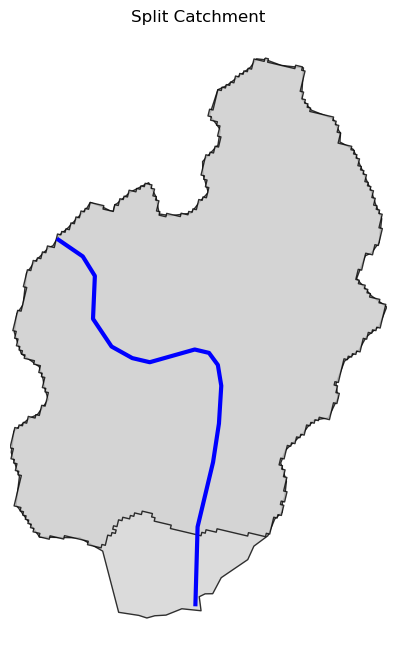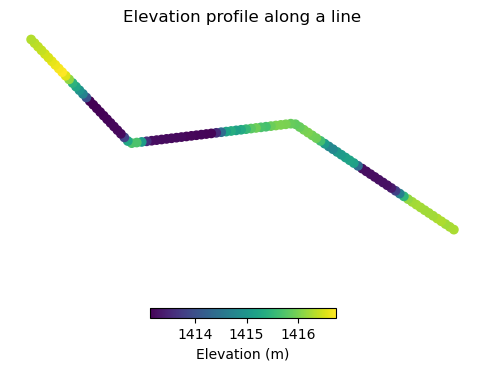This page was generated from pygeoapi.ipynb.
Interactive online version:
Split Catchment with PyGeoAPI#
[1]:
from __future__ import annotations
import geopandas as gpd
import shapely.geometry as sgeom
import pynhd
PyGeoAPI service provides four functionalities:
flow_trace: Trace flow from a starting point to up/downstream direction.split_catchment: Split the local catchment of a point of interest at the point’s location.elevation_profile: Extract elevation profile along aLineString.endpoints_profile: Extract elevation profile along a path between two points.cross_section: Extract cross-section at a point of interest along a flow line.
The pygeoapi function in PyNHD requires two inputs, a geopandas.GeoDataFrame that must contain all the required inputs corresponding to target services. Let’s take a look at them in an example:
[2]:
gdf = gpd.GeoDataFrame(
{
"direction": [
"none",
]
},
geometry=[sgeom.Point((1774209.63, 856381.68))],
crs="ESRI:102003",
)
trace = pynhd.pygeoapi(gdf, "flow_trace")
In the split_catchment service we can set upstream to True to get the entire upstream catchments not just the split local catchments.
[3]:
gdf = gpd.GeoDataFrame(
{
"upstream": [
False,
]
},
geometry=[sgeom.Point((-73.82705, 43.29139))],
crs=4326,
)
split = pynhd.pygeoapi(gdf, "split_catchment")
[4]:
ax = split.plot(figsize=(8, 8), facecolor="lightgrey", edgecolor="black", alpha=0.8)
trace.plot(ax=ax, color="b", linewidth=3.0)
ax.axis("off")
ax.set_title("Split Catchment")
ax.margins(x=0)
ax.figure.set_dpi(100)
ax.figure.savefig("_static/split_catchment.png", bbox_inches="tight", facecolor="w", dpi=100)

The elevation_profile service returns the elevation profile along a LineString at a given number of points and a specified resolution for DEM.
[5]:
coords = [
[-108.45263, 38.97755],
[-108.4535, 38.978],
[-108.454393, 38.977915],
[-108.45495, 38.97837],
]
gdf = gpd.GeoDataFrame(
{
"numpts": [
101,
],
"dem_res": [
1,
],
},
geometry=[sgeom.LineString(coords)],
crs=4326,
)
profile = pynhd.pygeoapi(gdf, "elevation_profile")
[6]:
ax = profile.plot(
column="elevation",
legend=True,
figsize=(6, 6),
legend_kwds={"label": "Elevation (m)", "orientation": "horizontal", "shrink": 0.4},
)
ax.set_title("Elevation profile along a line")
ax.set_axis_off()
